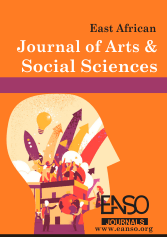Split Selves and Silenced Voices: Point of View, Othering, and Epistemic Violence in The Kite Runner and The God of Small Things
Abstract
This article examines how the narrative point of view in Khaled Hosseini’s The Kite Runner and Arundhati Roy’s The God of Small Things helps represent the processes of exclusion and the denial of knowledge or voice in postcolonial settings. Using insights from postcolonial and psychoanalytic theory, the study explores how narrative voice, memory, and silence influence the way readers understand power, identity, and belonging. In The Kite Runner, the use of a personal, first-person narration allows the main character, Amir, to shape the story through his own memories and interpretations. This control is not without bias. It supports existing social divisions related to class, ethnicity, and guilt by pushing aside less powerful voices, especially those of Hassan and other Hazara characters. By choosing which perspectives to include or leave out, Hosseini’s storytelling contributes to a quieter form of harm, where marginalised people are talked about but rarely get to speak for themselves. In contrast, Roy’s The God of Small Things uses a fragmented, third-person narrative that avoids straightforward storytelling, which gives control to a single viewpoint. The narrative shifts across periods and characters, bringing attention to voices and experiences that are usually ignored or hidden. This break from traditional storytelling is intentional. It challenges accepted ways of understanding the world and gives space to people pushed to the edges of society, especially due to caste, gender, and colonial history. The article argues that Roy’s narrative style disrupts one-sided storytelling and asks readers to engage with complex, layered truths. By comparing these two narrative approaches, the article shows that the way a story is told can be a powerful tool in either maintaining or challenging systems of control. Who tells the story, who is allowed depth, and who is silenced are not just stylistic decisions. They are closely tied to how power is created and maintained. Ultimately, the study shows how the narrative point of view can either support or push back against exclusion and silencing.
Downloads
References
Ashcroft, Bill. Post-Colonial Transformation. Routledge, 2001.
Boehmer, Elleke. Colonial and Postcolonial Literature: Migrant Metaphors. Oxford UP, 2005.
Caruth, Cathy. Unclaimed Experience: Trauma, Narrative, and History. Johns Hopkins UP, 1996.
Felman, Shoshana, and Dori Laub. Testimony: Crises of Witnessing in Literature, Psychoanalysis, and History. Routledge, 1992.
Freud, Sigmund. Beyond the Pleasure Principle. Norton, 1961.
Hosseini, Khaled. The Kite Runner. Riverhead Books, 2003.
Krishnaswamy, Revathi. “The Politics of Language in Postcolonial Literature.” Journal of Postcolonial Studies, vol. 10, no. 2, 2015, pp. 90–98.
Mishra, Vijay. “The Ethics of Fragmentation in Arundhati Roy’s Fiction.” Journal of Commonwealth Literature, vol. 44, no. 3, 2009, pp. 140–155.
Moosa, Ebrahim. “Confession and Complicity in Postcolonial Fiction.” Modern Fiction Studies, vol. 59, no. 2, 2013, pp. 210–228.
Mukherjee, Ankhi. What Is a Classic? Postcolonial Rewriting and Invention of the Canon. Stanford UP, 2016.
Nair, Meena. “Caste, Coloniality, and the Postcolonial Nation-State.” Interventions, vol. 20, no. 2, 2018, pp. 210–219.
Nussbaum, Martha. “Redemption and Narrative Ethics.” Ethics and Literature, vol. 6, no. 1, 2014, pp. 58–71.
Primrose, K. The Power of Narration and Stream of Consciousness in The God of Small Things. Journal of Teaching and Research in English Literature, vol. 10, no. 4, 2019, pp. 11-14. doi:10.xxxx/jtrel100403.
Roy, Arundhati. The God of Small Things. HarperCollins, 1997.
Said, Edward. Orientalism. Penguin, 1978.
Spivak, Gayatri Chakravorty. “Can the Subaltern Speak?” Marxism and the Interpretation of Culture, edited by Cary Nelson and Lawrence Grossberg, U of Illinois P, 1988, pp. 66–111.
Tyagi, Ritu. “Trauma and Testimony in Postcolonial Fiction.” Postcolonial Text, vol. 8, no. 2, 2012, pp. 160–172.
Taş, Mehmet Recep, and Elif Beyza Türkmenoğlu. “Invisible Barriers and Fragmented Lives: An Analysis of Alienation and Estrangement in Arundhati Roy's The God of Small Things.” Journal of Academic Studies in World Languages, Literatures and Translation, vol. 4, no. 2, 2023, pp. 172-188.
Copyright (c) 2025 Stella Kenyanya, Ajulu Okungu, PhD, Anna Kula Miti, PhD

This work is licensed under a Creative Commons Attribution 4.0 International License.




























